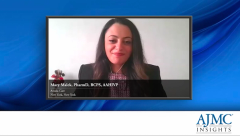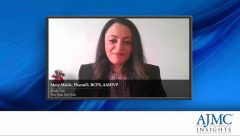
HIV and Risk of COVID-19
Episodes in this series

Drs Mary Malek and Moti Ramgopal remark on current myths associated with HIV and COVID-19, explain which patients are more at risk for contracting the illness, and highlight strategies to help reduce patients’ risk.
Transcript:
Mary Malek PharmD, BCPS, AAHIVP: There is a myth out there that patients who have HIV are at higher risk of acquiring COVID-19, [coronavirus disease 2019] especially in the beginning when we didn't have much understanding of the disease, around March/April. A lot of our patients were panicking. A lot of patients were calling us at the health plan and calling their providers, and asking what else could they do to prevent this, and are they really at higher risk? As time progressed, we saw that patients with HIV [had the same level of] risk as anybody else. The myth in the beginning was because maybe they have a [weaker] immune system, that they're immunocompromised, especially for patients who had a CD4 [cell] count of less than 200 [cells/mm3]. They are at higher risk of acquiring other opportunistic infections, so COVID-19 could be one of them.
We do have to be more careful with these patients, but for patients who are HIV suppressed and have high CD4 counts, we did not see a difference. We did, of course, see some of our patients acquire COVID-19, but not because they had a greater risk than other patients who did not have HIV. The correlation was similar between both, and the research coming out is supporting that idea. And hopefully, as time goes on, we will understand more. But for now, we do believe that patients with HIVhave a similar risk for COVID-19 as other patients.
With other comorbidities, like lung disease and heart disease, yes, you might be more at risk for COVID-19, but we did not see a correlation when it came to having HIV.
Moti Ramgopal, MD, FACP, FIDSA: The number 1 myth around HIV and coronavirus was that the HIV medications protect patients from developing coronavirus. I’ve had several of my patients who've been infected with the coronavirus. I had 1 patient who died; she had underlying pulmonary disorder. She was one of the rescue members during 9/11, so for the last 20 years, she had issues with pulmonary disease, COPD [chronic obstructive pulmonary disease]. And she was also diabetic. She developed COVID-19, ended up with respiratory failure, recovered to some extent, and subsequently died. I have had probably 1 other patient with HIV die. But most of my patients with HIV who have developed COVID-19 have recovered fairly well with minimal symptoms, minimal effects of COVID-19 after several weeks of being infected.
Patients who are HIV positive and patients who are HIV negative with COVID-19, when we look at HIV negative, [risk factors are]: high BMI [body mass index], COPD, underlying cardiac disease, underlying renal disease. When we look at our patients with HIV, a lot of these patients have those comorbidities.
A fair amount of our patients are diabetic. A fair about of patients have been treated for hepatitis C or have a BMI greater than 30, or they have history of cardiomyopathy, CHF [congestive heart failure], chronic pulmonary disorders. They will fall into the high-risk category not because they're HIV positive, but because of their comorbidities and the other issues of diabetes and hypertension, etc. Those patients who are high risk with HIV, we recommend that they start social distancing, wearing masks, avoid large gatherings. It is important they refill their medications on time. For those patients we try to do a fair amount of telemedicine visits, or if they have a cough or respiratory symptoms very early, we'll do an early visit in the clinic by telemedicine.
We try to advise those patients that if their symptoms progress, or they have fever or feel as though they were exposed to someone with COVID-19, to go to the emergency department. It’s important to educate the patients very quickly to recognize the risk factors. I look at my community of patients with HIV, about 30% are women. About 50% to 70% are African-American patients and Hispanic patients. And again, these are all risk factors for complications of COVID-19.
Newsletter
Stay ahead of policy, cost, and value—subscribe to AJMC for expert insights at the intersection of clinical care and health economics.






